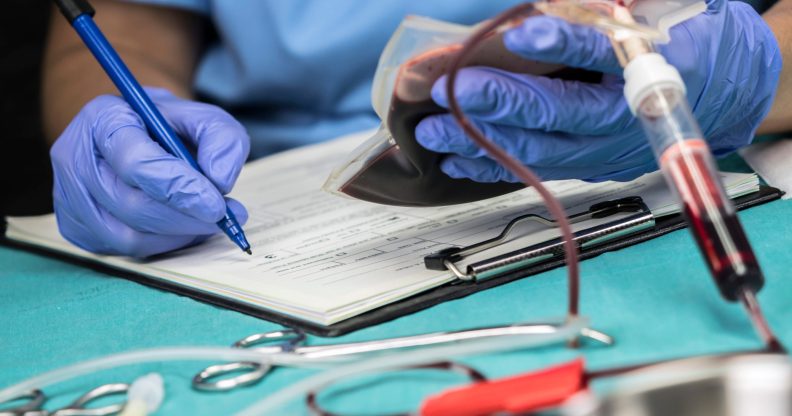More than 500 doctors and experts urge FDA to base blood donation rules on science and reason, rather than bigotry and homophobia

(Stock photograph via Elements Envato)
More than 500 doctors and experts have urged United States authorities to to overturn a “scientifically outdated ban” on gay and bisexual men donating blood.
The group of infectious disease and HIV specialists made the comments in an open letter addressed to the Food and Drug Administration (FDA) on Thursday (April 16).
The FDA recently relaxed its restrictions on gay and bisexual men donating blood, meaning queer men must now abstain from sex for three months instead of 12 in order to be eligible.
However activists have warned that the new measures do not go far enough and have insisted that a blanket ban on LGBT+ people is discriminatory and not based in science.
“As you well know, we are on the precipice of a critical nationwide shortage of blood products,” the experts wrote in their letter.
“This severe shortage could be alleviated if antiquated restrictions lacking scientific data were responsibly lifted.”
Revised blood donation policy for gay and bisexual men ‘does not go far enough’.
The experts cited a 2014 study from the UCLA School of Law which found that lifting the ban on gay and bisexual men donating blood would see 360,000 people become eligible. The study estimated that this could result in an additional 615,300 pints of blood donated each year.
“We are collectively obligated to immediately create policies and promote public health interventions that effectively address the many downstream crises created by the COVID-19 pandemic,” they wrote.
Gay and bisexual men were banned from donating blood in the US at the height of the AIDS epidemic in 1985. At that time, a man who had ever had sex with another man was banned for life — a restriction that was only lifted in 2015.
In the letter, the experts insist that improvements to testing mean that the chances of a person with HIV successfully donating blood are slim.
“Banning men from blood donation for at least a year since their most recent sexual encounter with a man is unscientific and based on outdated antibody-based HIV testing algorithms.
“Fortunately, we can reliably test for HIV using antigen-based assays and maintain the safety of the U.S. blood supply.”
The experts continued: “While the FDA’s recent decision to shorten the prohibition window to three months is a step in the right direction, it does not go far enough in reversing the unscientific ban.”
Queer men in monogamous relationships and/or on PrEP have a low risk of contracting HIV.
They also note that a number of countries such as Mexico, Russia, and some European and Asian countries have no ban on gay and bisexual men donating blood.
“Many countries, such as Italy and South Africa, have adopted a more rational, evidence-based, and effective risk-based assessment instead of blanket bans which only serve to stigmatise a group of potential donors and limit the pool of donors at this critical juncture in public health.”
“Policies and protocols which focus on targeted screening for specific high-risk behaviours, regardless of sexual orientation, are a much more scientifically rigorous and non-discriminatory approach to maintaining a safe blood supply.
“In fact, MSM [men who have sex with men] in monogamous relationships, those on Pre-exposure Prophylaxis (PrEP), and those who consistently use condoms have a particularly low risk of HIV acquisition.”
The experts ended their letter by urging the FDA to scrap its archaic ban in the face of the COVID-19 crisis.
“We are not advocating for relaxing standards that would compromise the safety of our blood supply. Instead, we advocate for scientifically-driven standards that uphold the utmost safety of the blood supply and simultaneously promote equity and reverse historical discrimination in blood donation.”
Human rights activist slammed the new policy as ‘misguided’.
Meanwhile, Human Rights Campaign (HRC) president Alphonso David has also urged the FDA to scrap its ban on gay and bisexual blood donors.
In an op-ed written for The Hill, David said the recent move to reduce the celibacy requirement from a year to three months was a “step forward”, but said the policy is still “flawed”.
“Any blanket policy directed toward a specific identity or community — and particularly one that has been stigmatised and marginalised for decades — is misguided and rooted in lasting bias,” he wrote.
“At no time in our nation’s history has it been more critical to prioritise science and facts over fear and bias. And given the current crisis and shortage of blood donors, the FDA solution is not a real solution or one driven by science,” he added.
A huge number of countries across the world first introduced blood donation bans on gay and bisexual men in the 1980s during the AIDS epidemic.
Many nations have eased restrictions, but have opted to replace a lifetime ban with a requirement for queer men to become celibate for a period of time in order to be an eligible donor.
Australia has also decided to relax its blood donation restrictions, meaning queer men will be able to donate blood after abstaining from sex for three months rather than 12-months.
However, as in the US, LGBT+ rights activists have argued that arbitrary bans on sexual minorities donating blood are discriminatory.

